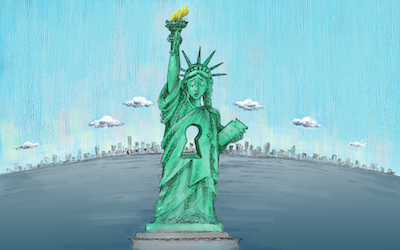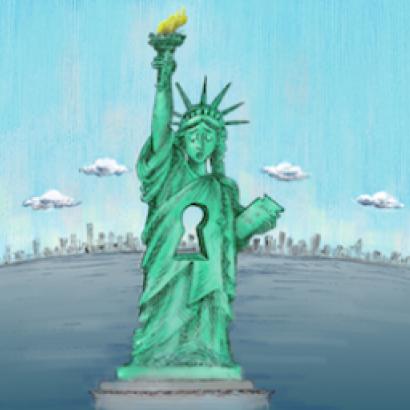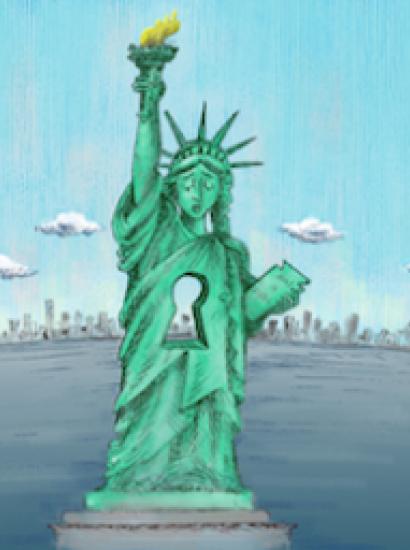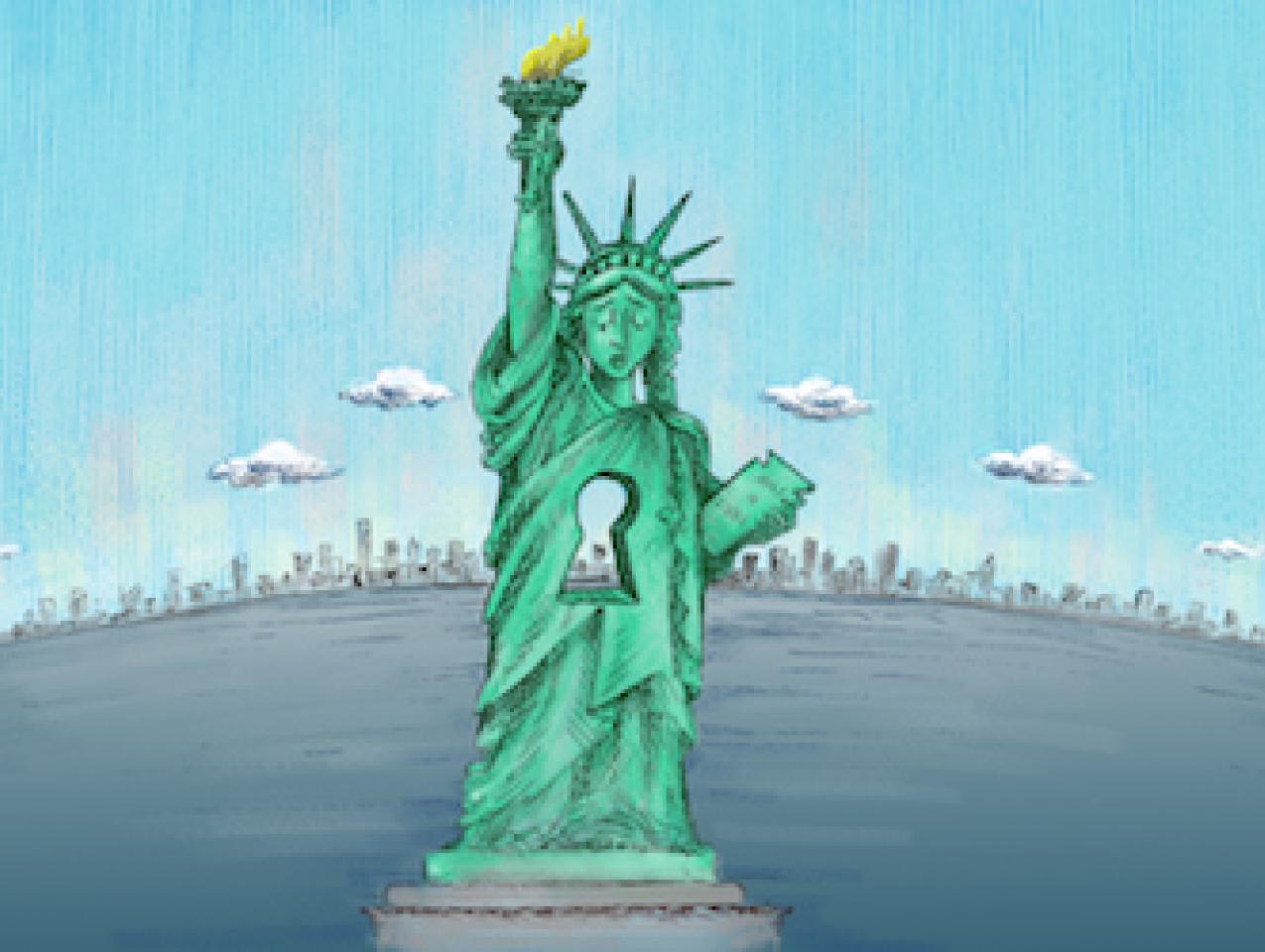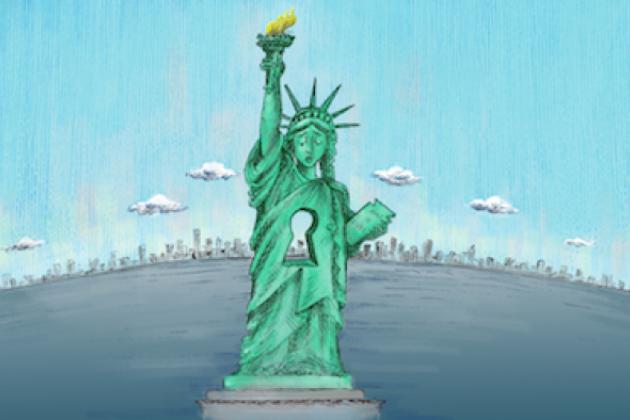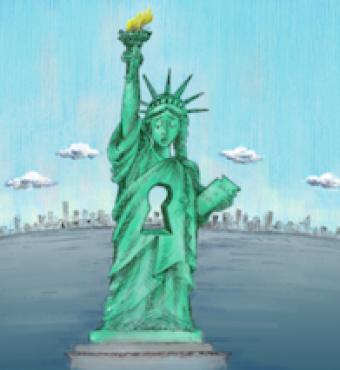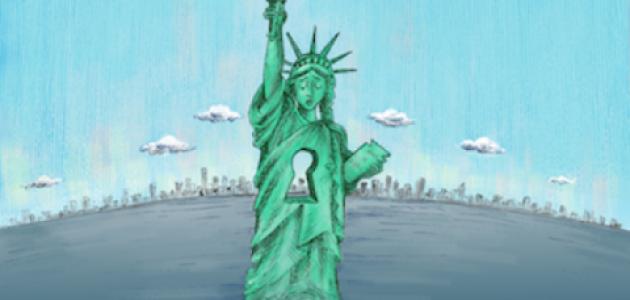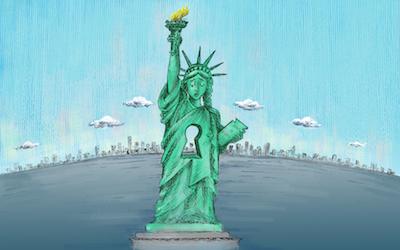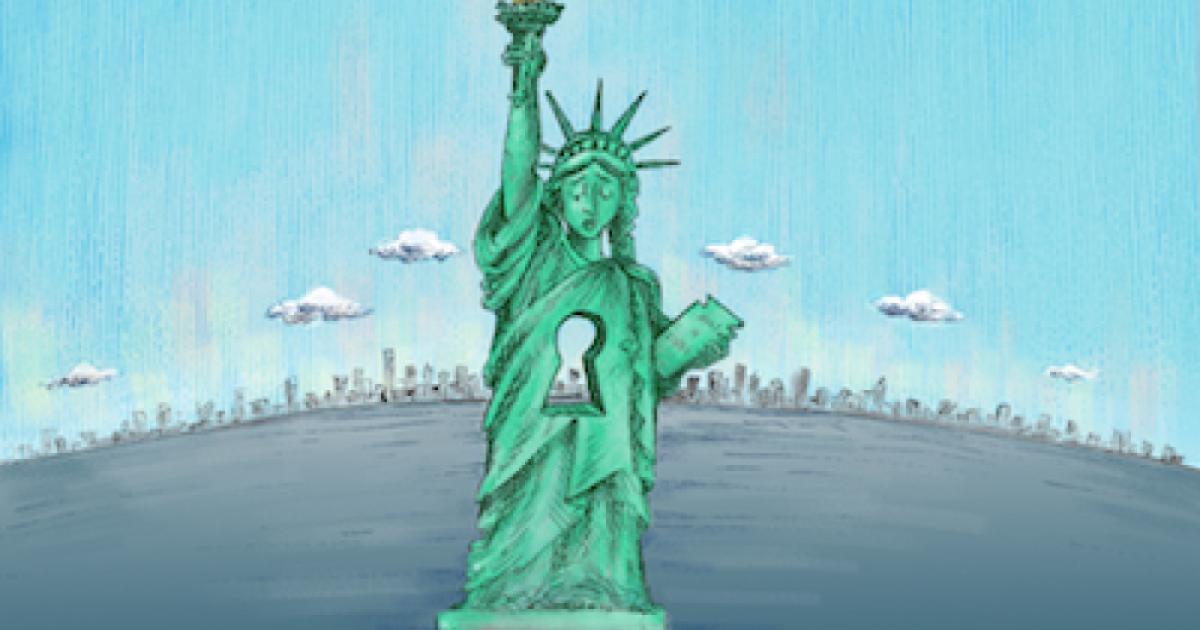- Law & Policy
Editor’s note: This essay is an excerpt from Angelo Codevillo’s new book, To Make and Keep Peace Among Ourselves and with All Nations (Hoover Press).
The loss of peace abroad has upset the balance between the various elements of life in America, fed domestic strife, and resulted in the loss of peace at home. The need for protection against foreign jihadists and their American imitators occasioned the empowerment of a vast apparatus of “homeland security” that treats all Americans as potential enemies—with only a pretense of even-handedness. In fact, the sense that enemies among us must be dealt with reinforced our bipartisan ruling class’s tendency to regard its own domestic political opponents as another set of persons whose backward ways must be guarded against and reformed. A spiral of strife among Americans resulted. In the light of history and of reason, any other outcome would have been surprising.
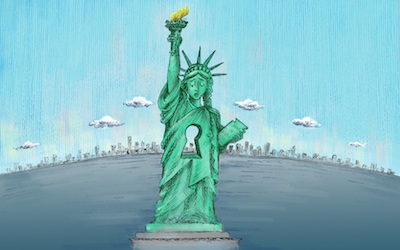
Illustration by Barbara Kelley
After 9/11 our ruling class came together on the proposition that, at home as well as abroad, America is at war against enemies so evil that there must be no limit to fighting them, whose identity we must always seek but can never know; that to focus on, to “profile,” the kinds of persons who have committed terrorist acts, is racist and provocative; that any American is as likely as any other to be a terrorist, and hence that all must submit to being sifted, screened, restricted—forever. Childhood in the “land of the free, the home of the brave” must now include learning to spread-eagle and be still as government employees run their hands over you. Patriotism is now supposed to mean obeisance to the security establishment, accepting that the authorities may impose martial law on whole cities, keep track of all phone calls, or take whatever action they choose against any person for the sake of “homeland security,” and that theirs alone is the choice whether to disclose the basis for whatever they do.
While the Obama administration ceased to use its predecessor’s term “war on terror” to describe its actions abroad, it redoubled commitment to “homeland security,” reorienting it to home-grown “extremism” defined ad hoc. The result seems less compatible with words such as “peace,” than with “Oceania,” the country in which George Orwell’s novel, 1984, is set.
Homeland Security as Domestic Nation-Building
George Washington had warned that foreign war naturally increases partisan strife at home. Indeed, strife at home and abroad often stems from the same presumptions of primacy. Recall that during the first half of the nineteenth century, Americans in the North and South devolved into nations yearning to force one another to recognize the superiority of their ways. The resulting Civil War’s winners first gloried in their disastrous attempt to reconstruct the losers and then fancied themselves entitled to improve, to reconstruct, lesser beings throughout the world including in the Northern states.
President Woodrow Wilson’s personal commitment to forcible reform dated to his post-Civil War student days: “I remember a classmate of mine saying, ‘Why, man, can’t you let anything alone?’ I said, ‘I let everything alone that you can show me is not itself moving in the wrong direction, but I am not going to let those things alone that I see going downhill.’”
The point is that, so long and insofar as any ruling class is possessed of this Wilsonian sense of intellectual-moral-political entitlement to nation-build, it must be a disturber of the peace—especially where it has the greatest power to do it. At home.
Instantly after 9/11, our ruling class intoned as a mantra that the event had “changed everything”—in America. But what, why, and to what end? We will now discuss how, post-9/11, our bipartisan ruling class brought home its oblivion of peace, and how this corrodes America’s core: the equality and interchangeability of rulers and ruled, liberty, the rule of law, peace among fellow citizens.
Nations, like armies, are seldom as cohesive, so at peace internally, as when first confronted by enemies-in-arms. Foreign terrorists having broken America’s domestic peace for foreign causes, Americans naturally drew closer to one another against the powers that embody those causes—the several Palestinian powers, Syria, Iraq, Saudi Arabia, Iran, etc.—as well as against their sympathizers and their cultures. But then our ruling class demanded that Americans put out of their minds that 9/11 had been perpetrated by Muslims acting on behalf of Muslim causes; it demanded that the American people put aside the distinction between fellow citizens and those who despise us, between our culture and theirs; that, as a gesture of peace toward the Muslim world, Americans make no distinction between themselves and the people, culture, and causes responsible for 9/11 and nearly all other acts of terror.
That meant demanding that Americans believe that any among ourselves are as likely as not to be terrorists. In sum, it demanded that Americans trust each other less than ever, but that they trust the authorities more than ever. Thus having diminished the natural distinctions between citizen and foreigner, familiar and alien, friend and enemy, our ruling class accentuated the artificial distinction between rulers and ruled. The former set of distinctions tends to bind a people together. The latter divides them.
Nevertheless, after a decade of “homeland security,” divided as the American people are among themselves, they seem increasingly united in distrusting the US government. Polls taken by the Washington Post as well as by Fox News after the April 15, 2013, bombing of the Boston Marathon that left 3 people dead and 208 injured, asking whether you fear more “that the government will not go far enough to investigate terrorism . . . or whether it will go too far,” found that respondents feared the government more than the terrorists by margins of seven to thirteen points, respectively. By contrast, similar polls after 9/11 had shown a huge reservoir of trust for the government. How did the government waste that trust?
Security as Sovereign
The US Department of Homeland Security’s statement of its mission, signed by President George W. Bush, states that: “The terrorist threat to America is an unavoidable byproduct of the technological, educational, economic, and social progress . . . an inescapable reality of life in the 21st century. It is a permanent condition to which America and the entire world must adjust. The need for homeland security, therefore, is not tied to any specific terrorist threat.” Any notion that we may rid ourselves of it is unrealistic, because terrorism “takes many forms . . . is often invisible.” Because we can never know our enemies, “[w]e can never be sure that we have defeated all of our terrorist enemies.”
The homeland-security regime thus established is not limited in focus or scope. Its political substance is to subordinate the people’s right to “life, liberty and the pursuit of happiness” under the “laws of Nature and Nature’s God”—to the principle that we must live as the security establishment thinks best. The document does not attempt to argue any of the above by appealing to reason through “proposition, objection, and rebuttal.” Nor did the Bush administration state the authority by which it imposed what amounts to a constitutional change. Nor were the provisions of the new way of life submitted to any sort of ratification. Rather, homeland security imposes itself through statute read by few and ratified by no one, as well as by the ruling class’s inertial force.
Insecuring America
The government’s new emphasis on security put additional strain on domestic peace and safety, already under pressure from other causes. Anyone may compare how much more menacing America feels in the twenty-first century from the way it felt as recently as the 1990s: ritual humiliations at the airport, Washington, DC, and government buildings turned into fortresses. Increasingly, airport-style “security” impeding access to major events from sports to wherever VIPs are present. VIPs with bodyguards, as in the third world everywhere demands for identification. Security cameras everywhere.
It takes special effort (and a certain age) to remember life before 1972, when there were no fences around airports, when anyone could walk into any public space unquestioned, and people did not walk around with (easily counterfeited) badges around their necks, when there were not thousands of government employees trained to shepherd us like sheep and we were not expected to act like sheep.
Whereas in 1963 Alabama Sheriff Bull Connor’s use of a mere cattle prod to disperse a crowd scandalized the nation, a generation later the police’s use of electroshock “tasers” and pepper spray to convulse (and occasionally kill) individuals who talk back to them had become unremarkable, routine, quotidian.
The culture of homeland security is corrosive of freedom. The nightly news inured a generation of Americans to squads of masked-men sporting the words “Police,” or “Federal Agent,” or “Security” on their backs clattering armored, armed, and menacing into “situations” in time to harass bystanders and hold ritual self--congratulatory press conferences.
The entertainment industry depicts as normal “reality” tales of government agents safeguarding the public by all manner of lawlessness. The 1950s popular TV show Dragnet personified that era’s peace officers: Its Sergeant Joe Friday wore jacket and tie, rang the doorbell, and addressed citizens with “yes ma’m, no ma’m.” But the turn-of-our-century paramilitary heroes of Dallas SWAT shout obscenities as they break down doors, shove, and shoot. In our time, it is not unusual for police to shoot unarmed citizens because “I thought he might have a gun.” Houston police killed a double amputee in a wheelchair who was wielding a ballpoint pen. Federal police shot dead a woman guilty of reckless driving between the White House and the Capitol, and a California cop killed a 13-year-old boy for carrying a toy plastic rifle. The popular cable TV series 24 was all about “security” agents torturing suspects. The latest version of the video game “Grand Theft” involves the player in torturing a prisoner. Habit-making fun.
Yet ordinary people have never felt less secure. Whereas few Americans felt the need to carry guns in the 1950s, when policemen were few and wore blue, in our time of pervasive “security” millions of Americans feel insecure enough to go about armed. Despite (or because) of regulations that make gun ownership more difficult, the market for guns and ammunition is overwhelmed. It is a falling barometer of confidence in government.
It makes as little sense to ascribe contemporary America’s insecurity to citizens’ felt need to provide their own as it does to consider fevers as causes rather than symptoms of infections. In fact, the relationship between true security, true peace, and civilization is as tight today as it was when legend has it that king Minos made it unnecessary for ordinary Greeks to go about armed by ridding the Aegean of pirates. Presumably, Minos did so by distinguishing pirates from non-pirates. But contemporary American “security” does not rid us of today’s pirates. Rather, pirates of all kinds now multiply because “security” confuses them with peaceable Americans.
Who Is the Enemy?
Discerning who domestic enemies may be and determining what is to be done about them—deciding about war and peace at home—is identical in principle to deciding it internationally. The new American security state’s refusal explicitly to distinguish good citizens from terrorists proceeds from the very same agnostic pretense by which our ruling class refuses to pass explicit judgment on the international causes and cultures in whose quarrels it partakes.
But that pretense of agnosticism shields implicit judgments from scrutiny. The Patriot Act of 2001 penalizes giving aid and comfort to terrorist organizations, while empowering the US government to designate any organization, association, or any individual as being somehow associated with “terrorists”—without having to justify to anyone its designation of “terrorists” or of association therewith. But while those designations are ad hoc, they are not random.
Our ruling class, as a matter of principle and of habit, has refused publicly to disclose, never mind to debate and to legislate, by what criteria anyone becomes liable to being designated a terrorist or other-wise an “enemy combatant,” and what might be done with, to, or about such persons. It treats these very criteria, supposing they exist, as state secrets. In practice, it distinguishes, indicts, convicts, and punishes people and ideas they happen not to like at the time for reasons of their own. It covers its actions by leaks to friendly media from high-level sources followed by orchestrated press campaigns. This is reminiscent of what Orwell described in 1984.
Discretion vs. Law
By way of example, in 2011 we learned from the New York Times of a secret document in which our Justice Department describes a set of decisions made during the summer of 2010 ordering and purporting to authorize the nonjudicial killing of a US citizen named Anwar al-Awlaki, the reasoning concerning which, the document takes pains to assure us, would not apply to any other citizen. But, strictly from the Times’ report, it seems impossible to discern any reason why the document’s death sentence would not apply to anyone to whom the president and his advisers might choose to apply it. Here is the Times’ paraphrase of it:
The Office of Legal Counsel . . . may have given oral approval for an attack on Mr. Awlaki before completing its detailed memorandum. . . . Mr. Awlaki had been placed on a kill-or-capture list around the time of the attempted bombing of a Detroit-bound airliner on Dec. 25, 2009. Mr. Awlaki was accused of helping to recruit the attacker for that operation. . . . Mr. Awlaki, who was born in New Mexico, was also accused of playing a role in a failed plot to bomb two cargo planes last year, part of a pattern of activities that counterterrorism officials have said showed that he had evolved from merely being a propagandist . . . to playing an operational role in Al Qaeda in the Arabian Peninsula’s continuing efforts to carry out terrorist attacks . . . . Based on those premises, the Justice Department concluded that Mr. Awlaki was covered by the authorization to use military force against Al Qaeda that Congress enacted shortly after the terrorist attacks of Sept. 11, . . .
Note that the anonymous accusation itself, not any substantiation thereof, was sufficient for the death sentence, and that the alleged acts of war, “helping to recruit,” “playing a role,” and “pattern of activities,” are subjective judgments, empty of objective meaning about what Awlaki actually did.
The unnamed “counterterrorism officials” took on the power effectively to decide that a state of war exists between the United States and a particular American citizen—effectively to declare war on an individual American, and to do so secretly. Moreover, no one seriously contends that any legislator who voted for the congressional authorization that is taken as tantamount to such a declaration of war meant to authorize the nonjudicial killing of an American citizen who is not “in arms,” but who is said by unnamed persons to have played an undefined role in an undefined organization’s anti-American activities.
The bureaucrats then make short work of the law: A federal statute that prohibits Americans from murdering other Americans abroad, the officials wrote, did not apply either, because it is not “murder” to kill a wartime enemy in compliance with the laws of war. . . . Then there was the Bill of Rights: the Fourth Amendment’s guarantee that a “person” cannot be seized by the government unreasonably, and the Fifth Amendment’s guarantee that the government may not deprive a person of life “without due process of law.” The memo dealt with that by stating that what is reasonable, and the process that is due, was different for Awlaki than for an ordinary criminal. It cited court cases allowing American citizens who had joined an enemy’s forces to be detained or prosecuted in a military court just like noncitizen enemies. But how had Awlaki “joined”? And joined precisely what? No answer.
The unnamed officials set aside the executive order and the statute just by deeming that the US citizen to be killed is an enemy in war. But under the US Constitution, the law of war comes into force only when a lawful state of war exists—and only a congressional declaration can create that state. Even if such a state existed, by what criteria had anyone determined that Awlaki was such a combatant? He did not make himself into a combatant self-evidently by appearing “in arms.” Nevertheless, say the officials, Awlaki was an imminent risk to innocent people: “The document’s authors argued that ‘imminent’ risks could include those by an enemy leader who is in the business of attacking the United States whenever possible, even if he is not in the midst of launching an attack at the precise moment he is located.” But the meaning of “imminent” according to the US government does not correspond to that found in dictionaries of the English language. Rather, the US government decrees that “imminent” now means being involved, in some undefined way, in “business” anonymously said to be “bad.”
Then in 2013 the Justice Department released an undated, unsigned “White Paper”2 constituting the US government’s official position on this matter, confirming the Times’ account, especially on the key point: an anonymous “high official” of the Justice Department is the ultimate authority over the life and death of an American citizen accused of joining with “al-Qaeda” or an “associate” thereof—whatever those words might mean.
Consider the constitutional reasoning behind this and Section 1021 of the National Defense Authorization Act of 2011. The Bush administration had argued that foreigners who the Executive deem to be “enemies”—unlike American citizens so deemed—are not entitled to constitutional protections arbitrated through legal “due process.” Obama, for his part, defended nonjudicial killing of Americans saying: “It’s not a bunch of folks in a room somewhere just making decisions. It’s part and parcel of our overall authority when it comes to battling al-Qaeda . . . focused at people who are on a list of active terrorists.”
Yet his administration’s criteria for who is to be killed, and the evidence for each case, are indeed the exclusive purview of “a bunch of folks in a room.” How does anyone know that these folks know what they are doing? That their criteria and information make sense? Thus far, the Bush and Obama positions are identical.
But the Obama administration went on to assert that foreigners, like Americans, are entitled to some unspecified “due process.” But then it defined this “due process” as something that could take place entirely within the executive branch. By this assertion the Obama administration, instead of raising foreigners to the legal status of citizens and that of combatants to the status of civilians, downgraded citizens to the status of foreigners and that of civilians to that of combatants. That assertion serves to pre-empt real “due process.”
As a result, the president and his advisers constituted themselves at once setters of criteria for enmity, accusers, judges, and killers of whomever they choose.
When the line between war and peace is erased; when the definition of enemies is anybody’s guess but in practice is the prerogative of a “high official”; when “battlefield” is defined as the world itself and “arms” are construed to mean words as well as swords; the “decider” may deem anyone to be an enemy-in-arms for whatever reason pleases the “decider.” Within which constitution does this fit?
The 2013 memo claims to draw its authority from “the inherent right of the United States to national self-defense under international law . . . and the existence of an armed conflict with al-Qa’ida under international law.” Nonsense: No treaty (including adherence to the UN charter’s Article 51) confers a right to self-defense. Nature itself does that. No treaty authorizes preclusive attack. Nor could any do so. The US armed forces carried out the operations that followed the 9/11 attacks under the US Congress’s Authorization for the Use of Military Force (AUMF) of September 2001. But that authority is limited to pursuing people somehow connected to those attacks. Yet the 2013 memo purports to invest the US government with the authority to kill people, including Americans, without even alleging connection with those attacks.
In sum, under Republican and Democratic administrations alike, the US government has been ready, willing, and able to assert authority to treat anyone it chooses, including fellow Americans, as enemies at its discretion.
Berkeley law professor John Yoo spelled out the principle that the law of war justifies its own discretion. Yoo wrote: “The days . . . when our forces against terrorism were limited to the Federal Bureau of Investigation, federal prosecutors, and the criminal justice system will not return.” They will not, he wrote, because a four-judge plurality of the Supreme Court agreed that Congress’s authorization of “all necessary and appropriate force” against all who may have been involved in the 9/11 attacks instituted a state of war that, he argued, means that henceforth, implicitly forever, the president could imprison as a prisoner of war anyone he deems an “enemy combatant” in the exercise of his war power, without justifying it to anybody.
Yoo argued against any limits on such detention: “[While the Court] acknowledged the ‘unconventional nature’ of the war on terrorism and suggested that if hostilities continued ‘for two generations,’ [Yaser] Hamdi’s detention might indeed exceed the government’s war powers . . . the court did not provide any reason why after two generations it may be necessary to reconsider the laws of war. If American troops remain engaged in combat in Afghanistan in 2040, the laws of war do not require the United States to release Hamdi or other Taliban detainees.”3 Or anybody else for that matter, or to justify it to anyone.
Yoo’s argument—the Bush administration’s argument, which some Republicans adopted as a badge of partisan pride—is that, war having been more or less authorized at one point but never defined, the US government may do thereafter in the name of war anything it thinks proper, indefinitely—and that it need not bother defining or reconciling its ends and means. Thus a slice of the conservative side of American public life, until recently the defender of individual rights as well as the advocate of winning wars, was led to espouse perpetual executive prerogative in the name of “security.”
Note well that this treatment of war, shared by both parties, excludes victory and peace while assuming that endless war cum homeland security is sustainable, indefinitely.
Cui Bono?
The least of reasons why it is not is that, in wartime more than ever, government power over domestic life tends to grow beyond the capacity of human beings to use it in nondestructive ways.
If victory and peace—ends that are quintessentially in the interest of the entire body politic—are not the natural end of the discretionary power inherent in war, what is? To whose end will the government exercise its ever-increasing capacity to intrude? Alas, the practical answer is “the discretion of the ruling class, ad hoc, in the interest of the ruling class.”
The case of Anwar Awlaki illustrates how the claim of “security” often hides government’s garden-variety tendency to cover its own incompetence, or worse. Awlaki’s involvement with terrorism predated by almost a decade the events cited in Justice Department memo that sentenced him to death, and his relationship with the US government was something that many in the government have an interest in burying.
According to Congress’ still classified “Joint Inquiry Into Intelli-gence Community Activities Before and After the Terrorist Attacks of September 11, 2001” Awlaki who worked as an Imam at a Saudi-financed mosque in southern California, helped Saudi intelligence officer Osama Bassnan establish two of the 9/11 hijackers on their arrival in America in 2000. The following year, having been transferred to another Saudi mosque near the Pentagon, he helped the two to get the IDs with which they boarded the planes that they helped to hijack. At the time, Awlaki lectured for a foundation financed by Saudi ambassador Prince Bandar, whose largess had made him everyone’s friend in Washington. Deputy Secretary of Defense Gordon England had Awlaki talk to the top Pentagon executives about how to get along with Muslims. In 2002, though, US customs arrested Awlaki, but released him to a “Saudi representative on orders of the FBI.” He later fled the US on a Saudi aircraft.
Just before 9/11, Mohammed Atta, the hijackers’ leader, visited the Sarasota, Florida home of Esam Ghazzawi, an adviser to the Saudi royal family. The day before the attack, Saudi official Saleh Hussayen stayed in the same Marriot at Dulles airport as three of the hijackers. Two days after the attacks, President George W. Bush received Prince Bandar at the White House, accepted his assurances, and evacuated from the US an unspecified number of Saudi officials, plus the family of Osama bin Laden. Since that time, the US government has done its best to quash inquiries into the role of Saudis in 9/11.
Concern for the safety of good Americans might just possibly not have been as powerful a motivator for killing Awlaki as solicitude for the reputations of not-so-competent or not-so-honest US government officials.
Well before 9/11, we had foretastes of what discretionary police powers mean in practice. Consider the modern security state’s legal paradigm: the Racketeer Influenced and Corrupt Organizations (RICO) Act of 1970. Passed to facilitate conviction of persons somehow connected with the Mafia—guys with names like Rico—since the 1990s RICO has been used against political enemies of every administration in power, most recently against pro-life organizations.
The “Iron Law”
The point is that the lack of explicit standards on which society has deliberated and agreed—that is, of law specified clearly and enforced impartially—invites those in power to make up standards, specs, policies, and rules as they go along, for their own convenience. Those in power become the law.
Inevitably, following the path of least resistance and maximum political advantage, the extension of post-9/11 police power in the name of fighting terrorism ended up serving partisan ends and degrading our peace.
The attempt to establish security without identifying, much less eliminating, those responsible for insecurity has transformed Ameri-can life. Apolitical policing of public life starts as impotent, random harassment. It ends, as Machiavelli wrote, in the empowerment of those who command the government to police for their own ends, and in the majority’s increasing alienation from the regime.
That is because it is impossible for officials who make up standards implicitly and unaccountably to do so apolitically. It would be strange indeed were decisions about the public’s enemies to abstract from the private prejudices and interests, from the partisan friendships and enmities of the human beings who make them. James Madison (Federalist #51) wrote that the American regime is based on the explicit recognition of interests and biases. Neglecting that, and barring explicit political decisions from the front door, ensures that implicit political decisions flood in through the windows.
The point here is that our ruling class’s judgments about friends and enemies are not based on defensible criteria. If such criteria existed, they would be the very same thing as “profiles” that screen bad guys from good, the very same thing as standards for security clearances. Such criteria would be set transparently, and those who set them could be held responsible for their substance. But, since the early 1970s, investigators for clearances have been ordered not to ask for or listen to, much less consider, any information about a person’s religion or politics.
Hence, the badge around the neck of the FBI agent or of the guy in the nuclear power plant’s control room is no more assurance that he will not commit mayhem than were the clearances granted to US Army Major Nidal Hassan, who killed thirteen fellow soldiers and wounded twenty-nine at Fort Hood, Texas. His business card—an advertisement rather than a secret—identified him as a “Soldier of Allah.” You should not imagine that the US government’s criteria for access to America’s most sensitive positions are qualitatively different from the ones by which it cleared Hassan.
Inevitably, then, apolitical policing is a pretense. By 2012, a Rasmussen poll showed that 64 percent of Americans were more afraid of terrorist attack from other Americans than from foreigners. No surprise. That had been the ruling class’s message for a decade. The focus on “homeland security” had succeeded in adding the suspicion of terrorism on top of all the reasons that Americans had to distrust and to blame one another for their troubles. But of whom should we be afraid?
Should the American people worry about, surveil, discourage, restrict, Muslims—visitors or home grown—who might have taken up jihad? The ruling class says, No, look elsewhere: Republican President George W. Bush reacted to 9/11, and Democratic President Barack Obama and Army Chief of Staff General George Casey reacted to Major Hassan’s 2010 murder of fellow soldiers at Fort Hood, Texas, and to the 2013 Boston Marathon bombing, by adjuring the American people not to attribute the carnage to any particular set of people, that is, to Islamists. On whom, then should “security” focus? By branding the obvious as politically incorrect, the ruling class made the designation “dangerous extremists” a matter of subjective likes and dislikes. But whose likes and dislikes?
Naturally, persons who possess the greatest power in government and society have the larger opportunity to direct blame and distrust, even to direct mayhem, onto those they like least. Since the mid-1990s, authoritative voices from Democratic President Bill Clinton to Republican New York Mayor Michael Bloomberg, echoed by the media, have intoned a familiar litany: America is beset by violence from racism, sexism, homophobia, and religious obscurantism, by domestic abuse, greed, and gun owners. These ills are not so different from those found in backward parts of the world where we fight “extremism” in order to fight terrorism. Indeed, these ills argue for fighting extremism, indeed for nation-building in America as well as abroad.
Whose Enemy?
Who in America embodies extremism? Who is inherently responsible for social ills, including terrorism? Who will have to be “nation-built,” reconstructed? What kind of people will have to have a new and better way of life forced upon them? No surprise: The ruling class’s political opponents, the conservative side of American life.
This started long ago. In 1963, the notion that President John F. Kennedy’s assassination was due to the “climate of hatred” in conservative Dallas, Texas, was rife in the ruling class, even though the assassin, Lee Harvey Oswald, was a Communist who had spent two years in the Soviet Union working with its GRU military intelligence service. The narrative is consistent. On the fiftieth anniversary of Kennedy’s assassination, the NBC network aired a show that continued the narrative of Dallas, the conservative killer city, without mentioning that the assassin was a Communist.
Today, computer searches find that the term “extremist” correlates in the major newspapers with “conservative” or “right wing” at twelve times the rate it does with “liberal” or “left wing.” Mayor Michael Bloomberg encapsulated the normalcy of this conflation when he imputed an attempted bombing of Times Square (by a jihadist, as it turned out) to “someone with a political agenda that doesn’t like the health care bill or something.”
No surprise, also, that, since 2006, the Department of Homeland Security has used its intelligence “fusion centers” to compile ominously worded dossiers against such groups as “pro-lifers” and such “antigovernment activists” as “homeschoolers” and “gun owners.” DHS has its own police force, the Federal Protective Service, that conducts monitoring and harassment of such groups, and conducts its “practice runs” against mockups of these groups. The FBI for its part infiltrates the Tea Parties as it once did the Communist Party—agent of the Soviet Union that it was.
This choice of targets follows not from any policy but from a view of America that is part of the ruing class’s identity. In January 2012, the DHS, in cooperation with the University of Maryland, published a study entitled Hot Spots of Terrorism and Other Crimes in the United States, 1979–2008. It classified as “extreme right wing terrorists” persons whom it judges to be “suspicious of centralized federal authority” or “reverent of individual liberty.” In July 2012, Colonel Kevin Benson of the US Army’s University of Foreign Military and Cultural Studies at Fort Leavenworth, Kansas, and Jennifer Weber of the University of Kansas published an article in the Small Wars Journal titled “Full Spectrum Operations in the Homeland: A ‘Vision’ of the Future,” arguing that the US Army should prepare itself for contingencies such as “extremist militia motivated by the goals of the ‘tea party’ movement” seizing a small town. The article argues that the Army’s Operating Concept 2016–2028 obliges “the military to execute without pause and as professionally as if it were acting overseas.” In 2013, the US Military Academy’s Combating Terrorism Center published a paper that cited approvingly the Southern Poverty Law Center’s (SPLC) indictment of the “far right”—which it defined as “conservatives”—as threats to national security. The SPLC is also a regular collaborator of the Department of Homeland Security. No official act is needed for likeminded persons at the top of society to act in mutually pleasing ways.
Nor, between 2001and 2010, was any official act needed for the FBI to confine its vast, fruitless effort to find the source of weapons-grade anthrax in the postal system to a hypothetical American (white) “mad, right-wing scientist”—an effort that drove one person to suicide and another to win a $5.6 million lawsuit against the US government for harassment, but that charged no one with anything.
Nor was it cause for wonder when, in 2010–2012, the Inter-nal Revenue Service audited over 500 conservative organizations concerned with “government spending, government debt or taxes; education of the public by advocacy/lobbying to make America a better place to live; statements in the case file criticize how the country is being run.” The IRS included Catholic and evangelical organizations, as well as the Tea Parties, demanding that its targets reveal details about their donors, whom it then audited aggressively along with donors to conservative candidates for office. In some cases, the IRS turned over these donor lists to the conservative organizations’ opponents for further harassment. One conservative who had formed a voter registration group had her business audited not just by the IRS, but by the FBI’s domestic terrorism unit, the Bureau of Alcohol, Tobacco, and Firearms, the Environmental Protection Agency, and the Occupational Safety and Health Administration (OSHA), as well. Moreover, when the targeted groups protested peacefully at IRS headquarters, they were met by armed DHS guards and helicopters, as befits presumed terrorists who are to be guarded against.
None of this is law, or even official policy, much less conspiracy. Rather, it reflects the prejudices and convenience, the intellectual, social, indeed the very identity of those in power. After all, in September 2010, President Barack Obama had called “enemies of democracy” the very groups that the IRS then subjected to punitive audits, and Vice President Joseph Biden had called some of them “terrorists.” In September and October 2013, in the context of a controversy over congressional appropriations, Obama administration spokesmen referred to these very same groups as “terrorists,” “jihad-ists,” “hostage takers,” etc. Indeed, a Rasmussen poll showed that 26 percent of the Obama administration’s supporters—possibly not the least influential among them—regard the Tea Parties as the top terrorist threat to America. Democratic senators and self--proclaimed “good government” groups aligned with them had written to the IRS urging the audits. So had President Obama’s White House counsel before taking office. Authoritatively, the IRS commissioners’ wife headed one of the groups clamoring for the audits.
Why should not officials all across the US government—from the IRS to the EPA to the Federal Elections Commission—act according to their superiors’ opinions, to what they hear from the best people and what they read in the best media, indeed according to their shared beliefs? Do not society’s most authoritative voices bolster those beliefs by indicting the conservative side of American life as extremists? Do not significant sectors of society applaud actions against them?
If such Americans really were “enemies of democracy,” if the Tea Parties terrorized the land, if the Catholic Church and evangelical organizations indeed were waging a “war on women,” if the Family Research Council were as “hateful and “bigoted” as the DHS’s Southern Poverty Law Center claims, if these American conservatives were truly the American version of the Taliban, then why should a government at war with extremism not save itself and society’s best elements from them? Why should it not use its official and officious powers to discourage, discredit, diminish them, make life difficult for them, make war on them insofar as possible? Why should it not help the party of good government and of good people prevail in a close election?
The Spiral of Strife
Whereas, in 1861, Lincoln had sought to head off civil war by forswearing discrimination against his opponents, our current ruling class builds support for itself among its constituencies precisely by such discrimination.
Alas, Newton’s Third Law applies to politics in our time as much as it ever did. Why should those targeted not return the favor with compound interest? Which party first deprives its opponents of peace and starts the spiral of strife is irrelevant. All human beings naturally crave excuses for treating their political opponents as bad people, as public enemies. As Thucydides’s account of Corcyra reminds us, using government power to hurt political opponents draws all into a spiral increasingly destructive of all. As more and more Americans succumb to this temptation, domestic peace slips away. Homeland Security has helped lead America into that spiral, the exit from which is harder than the entry.
The problem is not “profiling.” It is profiling of the implicit, irresponsible kind that happens to be wrong. Lack of accountability and transparency in decisions about friends and enemies means free rein for bureaucracies and ruling classes to justify their prejudices and to cover their insufficiencies.
If war, once exceptional, is henceforth normal and perpetual, and if all are liable to be treated as enemies, our complex of laws boils down to the Roman dictatorial formula: salus populi suprema lex. In the name of the people’s safety, the dictator’s will is law. But republican Rome’s “dictators” were appointed for brief emergencies for the purpose of returning the state to its ordinary laws, and themselves to live under them. Not incidentally, they were congenitally committed to victory. By contrast, the new American security state is committed neither to victory, nor to any purpose that transcends it. Least of all is it committed to transcending itself. Like Orwell’s Oceania, it is an endless end in itself.
The difference between America and Oceania, however, is all—important. Oceania’s subjects were Europeans, who suffered their rulers’ miserable wisdom without question. Americans don’t do that.







